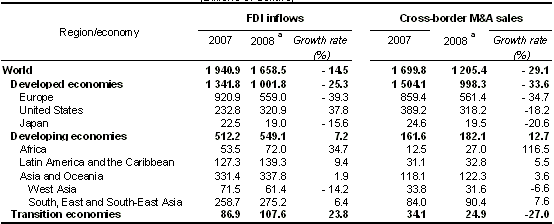Flows to developing and transition economies in decline
Geneva, 20 May 2009 - While developing and transition economies were quite resilient in 2008 during the downturn in global foreign direct investment (FDI) flows triggered by the economic and financial crisis, they will be increasingly affected in 2009 as international investment continues to decline: this is one of the findings of the UNCTAD study "Assessing the impact of the current financial and economic crisis on global FDI flows". The study updates the organization´s January assessment (UNCTAD/PRESS/PR/2007/001.rev1).
Due to the impact of the ongoing worldwide financial and economic crisis, FDI flows are estimated to have dropped by 15% in 2008 from a historic record of US$1.9 trillion in 2007 (table 1). A further decrease in FDI flows can be expected in 2009 as the full consequences of the crisis on transnational corporations´ (TNCs) investment expenditures continues to unfold.
The fall in global FDI in 2008-2009 is the result of two major factors affecting domestic as well as international investment. First, the capability of firms to invest has been reduced by a reduction in access to financial resources, both internally - due to a decline in corporate profits - and externally - due to lower availability and higher costs of finance. Second, the propensity to invest has been diminished by negative economic prospects, especially in developed countries hit by the most severe recession of the post-war era.
The setback in FDI has particularly affected cross-border mergers and acquisitions (M&As), the value of which was in sharp decline in 2008 and 2009 as compared to the previous year´s historic high. Practically all sectors have been affected by a decrease in cross-border M&As in 2008, with the exception of oil, mining, and agrifood businesses.
In 2008, flows into developing economies continued to grow (by 7%), though at a much slower rate. An outright decline in FDI inflows to those countries is taking place in 2009 as a result of pull-backs in efficiency- and resource-seeking FDI that normally would fund exports to advanced economies. Those economies are currently depressed. There also are declines in market-seeking FDI aimed at servicing local markets, where growth prospects - though still positive - are receding.
In the short term, the negative impact of the recession on global FDI prospects should be the dominant force affecting investment flows. Nevertheless, some favourable factors for FDI growth are still at work, some of which are even a consequence of the crisis itself. Driving forces such as investment opportunities triggered by cheap asset prices and industry restructuring; large amounts of financial resources available in emerging countries; quick expansion of new activities such as new energy- and environment-related industries: and a resilient trend in the internationalization of companies will presumably trigger, sooner or later, a pickup in FDI flows. A U-shape scenario (with a slow recovery beginning in late 2010 or 2011) is currently considered most probable.
The exact date of this upward trend will, however, depend on a series of factors such as the speed of economic and financial recovery, the return of investor confidence, and the efficiency of public policy in addressing the causes of the crisis.
Key issues in this respect are the prevention of protectionism, a renewed commitment to an open environment for inward and outward FDI, and structural reforms aimed at ensuring more stability in the global financial system. Recent announcements and commitments made at the London G-20 Summit of April 2009 have reconfirmed these policy stances. In addition, measures aimed at promoting investment and innovation could play a significant role in accelerating world economic recovery. An analysis of recent developments in FDI-related regulations and policies suggests that so far the crisis has not triggered any significant protectionist backlash against foreign investment.
ANNEX
Tables and figures
Table 1. FDI inflows and cross-border M&A sales, by region and major economy, 2007-2008 a (Billions of dollars)
Source: UNCTAD
a Preliminary estimates. Final figures will be in the World Investment Report 2009.
Note:World FDI inflows in 2008 are projected on the basis of data for 103 economies for which data were available for either all or part of 2008 as of 6 April 2009. Data for which only part of 2008 are available are estimated by annualizing the data. The proportion of inflows to these economies in total inflows to their respective region or subregion in 2007 is used to extrapolate the 2008 data . For cross-border M&As, estimates were made on the basis of data available as of 5 January 2009.


